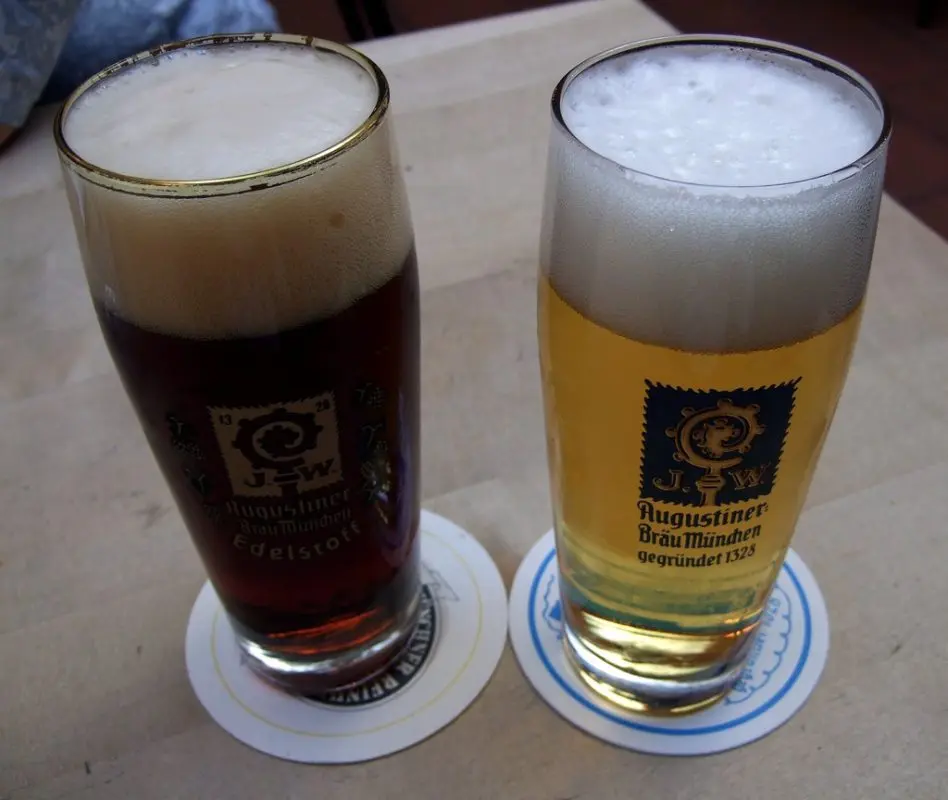Contents
Augustiner is one of the oldest beer brands, whose name comes from the brewery of the Augustinian monks, first mentioned in 1328. Augustiner is produced exclusively in accordance with the Reinheitsgebot law of 1516, according to which water, yeast, hops, barley or wheat malt are used to make a genuine intoxicating drink. Currently, the brewery produces no more than 1 million liters of beer annually with an alcohol content of over 5,2%. Weak and non-alcoholic drinks in the assortment are absent.
Augustiner-Bräu, which is controlled by a charitable foundation, is not part of the structure of global beer corporations and does not run advertising campaigns. Nevertheless, Augustiner is popular far beyond Munich, and is exported in limited quantities to the United States. Today, the brewery produces five traditional varieties and three seasonal brands of foamy drink. Munich beer, brewed according to traditional recipes and technologies, is also found on Russian shelves.
Historical information
The starting point in the history of Augustiner-Bräu is 1328, when a brewery was launched in a monastery near the Munich Cathedral. For almost three centuries, the brewery supplied strong beer to the Dukes of Wittelsbach and was exempted from the tax burden. By the middle of the 18th century, the annual capacity was a quarter of a million liters of beer, three times the capacity of the average brewery of the time.
At the beginning of the 19th century, production was transferred from the dilapidated monastery premises to Neuhauser Strasse, and in 1829 the brewery became the property of the Wagner family, who owned the company until the end of the last century. The production of beer “Augustiner” was modernized while maintaining traditional technologies. In 1852, steam engines were installed at the enterprise. In 1971, stainless steel containers were installed in the brewhouse.
It has been documented that Augustiner-Bräu has been present at the Oktoberfest beer festival since at least 1867, and today is one of the six permanent beer producers of this annual event.
Interesting Facts
- The water for the frothy drink is extracted from a 230-meter well, and the traditional tennenmälzens technology is used in the production of malt, laying out germinating barley in a 40 x 10 m room on a lime floor, where the grain has the opportunity to breathe.
- The design of the label and the shape of the bottle, referred to as the construction worker’s half-liter (Bauarbeiterhalbe), remain unchanged.
- Augustiner beer is the only beer presented at Oktoberfest and, like centuries ago, is poured from oak barrels during the festival.
- In addition to the special Oktoberfestbier beer for the autumn festival, the company brews two more seasonal varieties: Maximator for Lent and Heller Bock for early summer.
Types of beer “Augustiner”
Augustiner noble substance, 5,6%
A light, pale golden beer with a lush head that has been brewed since 1925. Notes of meadow herbs, honey, hops, banana and citrus fruits are clearly audible in the barley aroma. The taste of the Bavarian drink is soft and sweet, but balanced by noble bitterness and exquisite freshness of hops.
Augustiner Dunkel, 5,6%
A dark amber-brown Munich beer with a light, rich head. The typical malty aroma is complemented by aromas of roasted coffee and bread toast, chocolate, caramel, fresh fruit and hops. The taste is sweetish-velvety with a barely perceptible sourness and a slight bitterness in the aftertaste.
Augustiner Lager beer light, 5,2%
Light straw-coloured Bavarian lager, aged in oak barrels. It has a mild refreshing taste, in which the sweetness is balanced by a light hop bitterness and a hint of bread. In the aroma we distinguish the smell of roasted barley, hops, lemon and caramel. Beer is combined with traditional German dishes, seafood, cheeses, pork.
Augustiner Weissbier, 5,4%
Unfiltered wheat beer with a light amber hue, produced since 1986 from traditional ingredients. The unpasteurized drink, which matures in a wooden barrel but matures in the bottle, has a malty aroma with hints of yeast, as well as hints of spice and banana. Spicy sweetish taste with hop bitterness is combined with Bavarian dishes, fish, salads.










